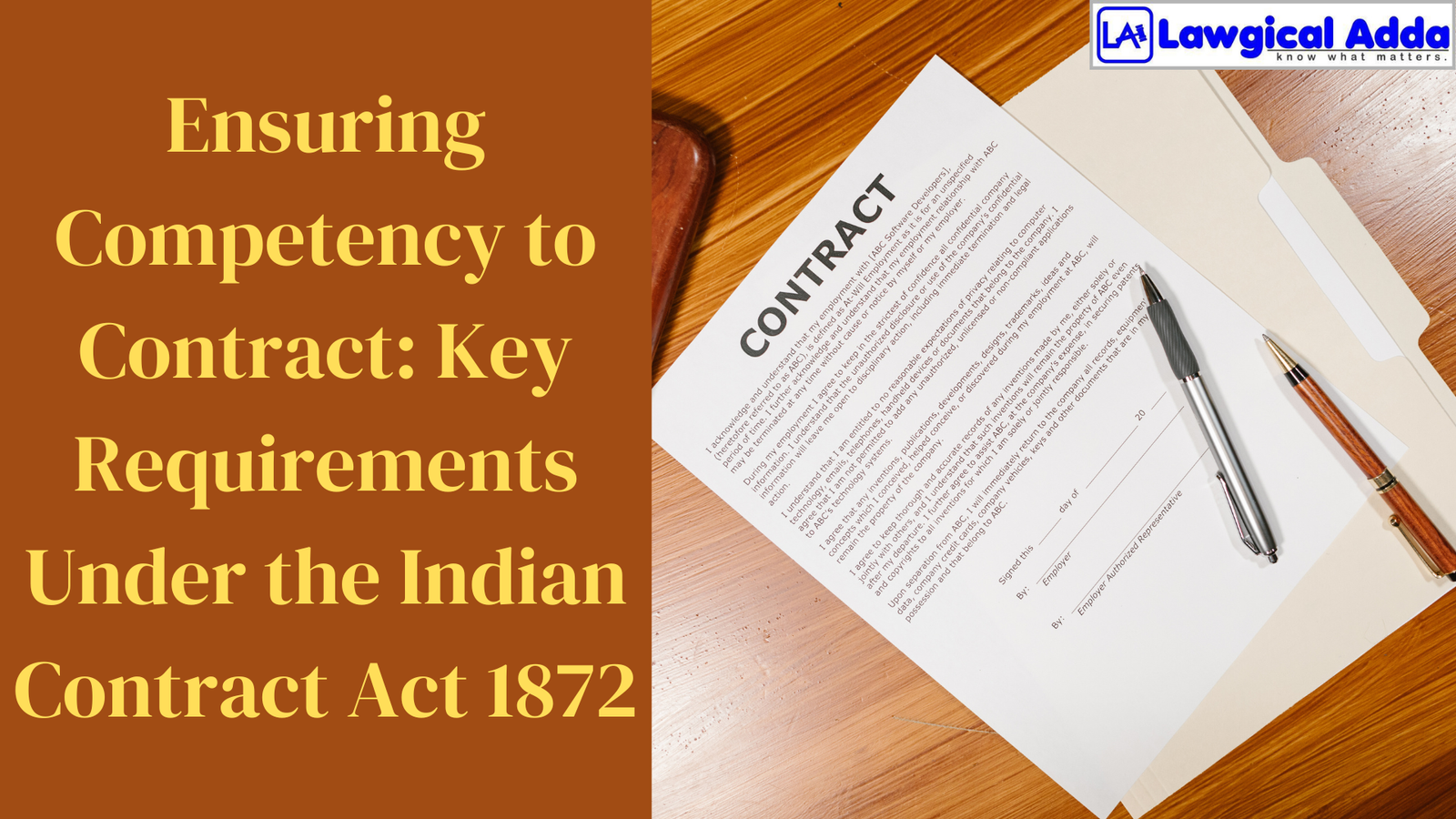Ensuring Competency to Contract: Key Requirements Under the Indian Contract Act 1872

Table of Contents
Introduction
One of the most fundamental components of a legal contract is the parties’ ability to enter into one. According to “Article 11 of the Indian Contract Act 1872,” a person must meet three requirements before entering into a contract: they must be of legal age, sound mind, and not be barred from entering into contracts by any applicable laws. We shall look closely at each of these subjects in this essay.
Comprehending Competency in the Formation of Contracts
Competency to contract, sometimes known as contractual capacity, refers to a person’s ability to enter into a contract legally. It assures that the parties in question have the mental and legal capacity to understand and be bound by the terms of the contract.
Section 11 of the Indian Contract Act 1872 delineates the standards for ascertaining an individual’s competence to enter into contracts in India.
- Age of Majority
A person must be of legal age to be deemed competent to engage in a contract. In India, eighteen is considered the age of majority.
- Soundness of Mind
Being competent also means that the person is mentally sound. They must, therefore, be able to comprehend the nature of the contract and its implications.
A person is deemed incapable of entering into a contract if they have a mental illness at the time of the agreement.
- Not Prohibited by Law
The person must also not be prohibited from entering into a contract by any relevant laws. Specific legal provisions may prevent people from making certain kinds of contracts. It is necessary to be aware of these legal limitations to guarantee the contract’s legitimacy.
- Children
Minors are one group deemed incapable of entering into contracts in India. In India, those under eighteen are classified as minors per the rules outlined in Section 3 of the Indian Majority Act of 1875.
However, this law applies in cases where a court has designated a guardian to oversee the minor’s assets or welfare. In certain situations, the minor is considered to be underage until they become 21.
- Character of Agreements with Minors
Generally speaking, agreements with minors are void ab initio, meaning they are void from the outset. The well-known Mohri Bibee v. Dharmodas Ghosh case provided clarification on this stance.
In reiterating that minors are not permitted to enter into contracts in line with Section 10 of the Indian Contract Act, the court emphasized how crucial it is for all parties to be of legal age.
- Effect of a Minor’s Agreement
A contract containing a minor’s agreement is void ab initio, meaning it is void from the start. Legal doctrines such as estoppel and restitution do not cover minors. Furthermore, a contract signed by a minor is deemed invalid from the beginning and cannot be legally enforced.
Nonetheless, in compliance with Section 68 of the Indian Contract Act, the person offering goods and services to a minor may pursue payment from the minor’s assets.
Persons of Unsound Mind: Incompetent to Contract
A further group of people who are considered incapable of signing contracts is mentally incompetent. A person who cannot comprehend the terms of the agreement and how they affect their interests is deemed to be of unsound mind, according to Section 12 of the Indian Contract Act.
Individuals Disqualified: Unfit to Enter into a Contract
Due to their corporate, political, or legal status, some people are not allowed to sign contracts. These individuals are likewise seen as being incapable of entering into contracts. Now, let’s investigate a few of these categories:
A man whose nation is at war with India is referred to as an alien enemy. Under the Indian Contract Act, contracts with foreign allies are enforceable, but contracts with foreign adversaries are null and void. No agreement with an enemy foreign power may be signed during a conflict without the Indian government’s prior approval.
Foreign Sovereigns and Diplomats
Unless they voluntarily submit to the jurisdiction of Indian courts, foreign sovereigns are usually granted particular privileges and immunities that shield them from legal action. They are also prohibited from signing contracts unless an Indian citizen obtains prior permission from the Indian government to file a lawsuit against them in an Indian court of law.
Convicts
Those who have been found guilty and sentenced by a court of competent jurisdiction to death or incarceration are not permitted to participate in contracts while serving their terms. However, their ability to sign contracts is restored after serving their time or being granted a pardon.
An insolvent person
They cannot pay their debts off when they become due. An insolvent is often regarded as incompetent to contract until they are legally discharged by a court of law, even if no explicit ban prevents them from entering into contracts once insolvency proceedings have begun but before adjudication.
Corporations
A corporation’s ability to engage in contracts varies depending on its nature. A firm can generally enter into contracts because it is an artificial legal entity. Its ability to contract, nevertheless, might be restricted in some ways by the law or the constitution.
Conclusion
To sum up, to guarantee the validity and enforceability of contracts, it is essential to comprehend the idea of competency to contract formulation. To be deemed competent to contract, a person must meet the requirements of the Indian Contract Act, which include being of sound mind, having reached majority age, and not being legally disqualified.
Focus on what you do the best! Let Lawgical Adda handle the rest. Choose our services for your legal needs. Contact us today!
For more in-depth insights and detailed information on various legal topics, follow Lawgical Adda. Stay updated with the latest articles, expert analyses, and practical advice on corporate law, company regulations, and much more. Join our community and enhance you legal knowledge today!



